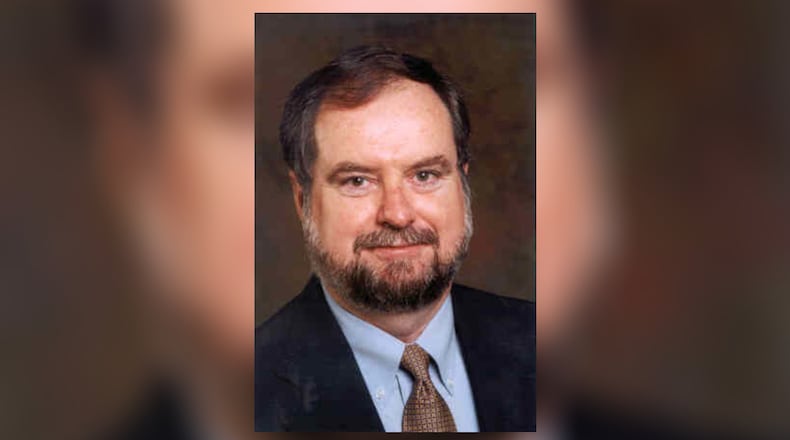Wearing her U.S. Public Health Service uniform and name tag, Capt. Jennifer Bornemann routinely met people in her workplace who asked if she knew Thom Bornemann. When she told them he was her father, “They’d say he was the greatest boss they ever had. And he had been gone 15 years by then. He really impacted a lot of people.”
A lifelong advocate for the voiceless and vulnerable, Dr. Thomas Bornemann died from Alzheimer’s disease in Alpharetta on April 3, his 54th wedding anniversary.
Born on Oct. 10, 1948, in Orlando, Florida, he was the youngest of four children of Joseph Bornemann and Elizabeth “Muffy” O’Grady Bornemann. He earned a bachelor’s degree from the University of Central Florida and a master’s in social work from Tulane University. He never forgot his Florida roots, his daughter Lara Bornemann Mish said — he loved Florida State University football and followed it closely. He also loved baseball.
Bornemann spent two years in the U.S. Army. At Fort McPherson, where his wife, Cynthia Bornemann, gave birth to twin daughters. After finishing Tulane, Bornemann accepted a commission as a lieutenant in the U.S. Public Health Service and was sent to an agency hospital in San Francisco. While there, his wife gave birth to anther girl, and he earned an Ed.D. in counseling psychology from the University of San Francisco, “but how he did that, I’ll never know,” said Mish. “And my mother finished her B.A.”
When the USPHS hospital closed, the family moved to Washington, D.C., and Bornemann began working for the Substance Abuse and Mental Health Service Administration, part of the U.S. Department of Health and Human Services. There, one assignment was in the Cuban Haitian Mental Health Unit, where he worked with Dr. Brian Flynn helping place refugees in safe living conditions and providing them with mental health care. The two men became best friends as they crisscrossed the country, trying to set up suitable residences and often encountering public meetings full of hostile crowds.
“We were thrown out of every major city, and we bonded over that,” says Flynn. “Thom was unrelenting in his desire to provide people with the care they needed. We believed in public service as much as religion.”
Bornemann helped develop the first U.S. Surgeon General’s Report on Mental Health, which made people realize mental health was a critical component of overall well-being. His last position in the HHS, where he attained the rank of Rear Admiral, was as deputy director for the Center for Mental Health Services. In addition to possessing top-notch speaking and writing skills, Bornemann had exceptional group management skills, Flynn says. “I always enjoyed being in meetings that Thom was running because everyone got to speak, and problems were solved. I loved seeing him work, it was like he was conducting a symphony.”
Then-Surgeon General David Satcher asked Bornemann to represent the United States in the World Health Organization. The Bornemanns moved to Geneva, Switzerland, where he worked for two years, “and they traveled everywhere,” said Mish. “My father liked good wine, good food and better company. And he loved to travel.”
Returning to the U.S., Bornemann joined the staff of the Carter Center, where he headed up its mental health program, traveling with Rosalynn Carter to design systems and deliver services around the world. In Liberia, he helped to update laws and regulations and build an advocacy community “so people could ask for service,” says Eve Byrd. She took over Bornemann’s job at the Carter Center. “Liberia had an opportunity to build a mental health system right the first time.” He also advocated for the passage of legislation assuring that benefits for behavioral health and substance use disorders would be on par with physical health benefits.
Even when he was diagnosed with Alzheimer’s, Bornemann continued thinking of others, said Flynn. “He joined a clinical trial at Emory, and said even if they couldn’t do anything for him, maybe he could do something for someone else.”
At home with his family, Bornemann perfected his skills at preparing different cuisines, including Chinese food, said daughter Sarah Flaman. The three sisters loved his hot-and-sour soup, marinara sauce and Steak Diane. “There wasn’t a dish he didn’t dirty. We used to say that he was the chef and our mom was the cook.”
Thom Bornemann is survived by his spouse, Cynthia Wright Bornemann; daughters, Lara Bornemann Mish (Kevin), Jen Bornemann (Stefanie Skiest) and Sarah Bornemann Flaman (Todd); and four granddaughters. Donations may be made to the Alzheimer’s Association or the Carter Center.
About the Author
Keep Reading
The Latest
Featured



